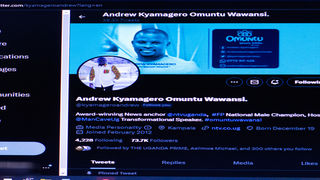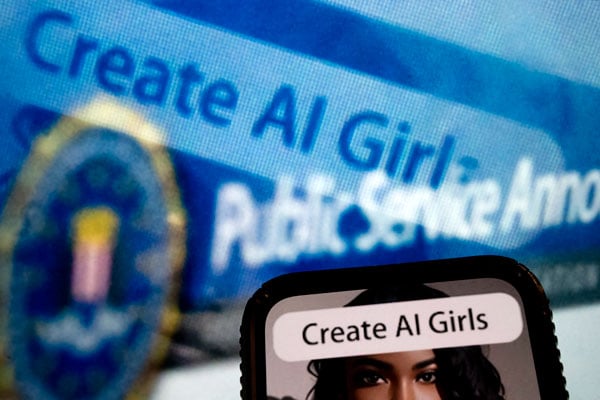
A Twitter profile of Andrew Kyamagero. When sifting through applications and deciding which people to interview, most employers look at applicants’ social media profiles. PHOTO / MICHAEL KAKUMIRIZI
|Prosper
Prime
Creating an authentic online profile
What you need to know:
Employers screen potential candidates’ social media profiles when considering them for a position.
Following the pandemic, online business picked up. It is now anyone’s asset to have a credible online profile. But, it depends on the kind of business you are in. “People do business with people they trust,” Mr Mustapha Mugisa, a digital analyst says.
According to GitHub, an online profile is a person’s or company’s third component of a compelling marketing campaign. Therefore, it serves two functions:
First, it is a marketing tool for passive job search because the majority of recruiters use online profiles to find qualified candidates.
Secondly, it is also a great networking tool because you can connect with friends, family, former coworkers, and current schoolmates and stay in touch with them easily regardless of where you live or work.
Your online profile says a lot about you. So, you must be strategic about creating it. Building an online profile is a balance between understanding one’s audience and what they have to offer. Mr Dan Odaka, the digital channels manager, at Airtel Uganda, says a single brand cannot appeal to everyone.
“First identify the audience that your brand appeals to because they will be willing to hear you out. This can be done with the help of marketing research tools such as Buzz Sumo or Hubspot,” he says.
With the audience determined, a brand then needs to identify a suitable message. “This message is usually picked from the vision or mission of the brand,” he says.
For instance, a brand such as Coca-Cola whose mission is to spread happiness through their beverages, chooses messages like ‘Taste the feeling’ or ‘Open Happiness’.
“Nike whose mission is to sell high-quality sports gear uses the message ‘Just do it’ as a call to all those who want to do more to go for their desire without excuses. The short of it is that the message or tagline must communicate and sell the brand well,” he says.
With that out of the way, the brand ought to choose the medium of communication and representation. This can be social media platforms, influencers, websites or blogs. This medium must be accessible to the target audience.
Mr Odaka adds that the medium should be one the audience is comfortable with and has access to.
Thereafter, the brand needs to be consistent in reiterating its message and Mr Odaka says this takes the form of:
Storytelling: The brand tells the story of how it came to be or why it chose that vision/mission. “This makes the audience learn and understand the brand’s journey and those that resonate with that story or appreciate it will stick with the brand. This can be in the form of social media posts, videos or online discussions,” he says.
Advertising: It allows a brand to reach a much wider audience of fans and those who are not. Advertising can be on social media or the web space through Google and display advertising or YouTube ads.
Testimonials: Brands can also use testimonies of customers and fans to showcase what they do and their excellence at it without seeming like they paid people to speak on their behalf. “The beauty of authentic testimonies is that they draw in the interested clients,” he says.
Brand ambassadors
Brands can also work with individuals who represent what the company or person stand for to represent them in the public.
Professional online profile
While the above is a general approach to creating an online profile, professionals may also leverage LinkedIn, a professional version of Facebook. It offers professionals the ability to make connections based on their field of work, workplace (former and present), and school, but also through your friends. That is why it is important to fill in all the profile spaces as LinkedIn will make several recommendations of people that add to your list of online friends.
Rather than simply clicking the connect button to build your network, send people personalised message requests. That makes it more intentional and magnetises someone to respond positively.
Profile picture
Another thing to note is that your choice of profile picture is important because pictures speak more than words. Therefore, rather than a sassy picture, get a professional picture for your profile.
It is also crucial to add your resume to your profile because you never know who will take a peek at your profile. It just might be your next employer.
Digital footprint
However, the University of Alberta also points out that your online presence/profile is made up of your personally-identifying content and information on the internet. This may also include posts on LinkedIn, Facebook, Instagram, Twitter, YouTube, personal websites, Tumblr, and blogs.
Mr Mugisa augments that saying information about you on other sites posted by other people is more credible than the information you have written about yourself. “That is why top companies such as Google search favour up-to-date profiles, and will bring several pages about the subject,” he says.
Mr Mugisa adds that if one is a motivational speaker, but even Google cannot find them online, something is not right. A professor worth their name should have peer-reviewed journals in top publications over and above the information they have written about themselves on their LinkedIn or personal blog or website.
“As a consultant, I need to ask myself which businesses I have supported that can give testimonials about my work quality. Does Google know me if someone searched for Mustapha B Mugisa? Those are questions that must be answered for online credibility,” he says.
That is why GitHub says while employers will look at the likes of LinkedIn to know more about their intended employees, they will also look at their Facebook profile.
“When three candidates seem equally suited for a position, a swipe through their Facebook profiles may provide information that becomes the deciding factor. It is therefore important to ensure that information on your Facebook page can only help your job search or endear you to your intended clients. Foul language and inappropriate pictures will only dent your online profile,” the site reads in part.
Some people think that social media privacy settings can filter individuals from viewing their information hence putting all sorts of information based on how they feel on a particular day. However, those settings have often failed hence the need to be cautious because your digital footprint matters.





